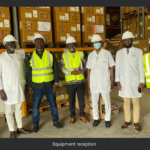DIRECT PURCHASES TO REGIONS
Mozambique, with its long and narrow geography spanning over 2.5 thousand km of coastline (north to south) and a width (east to west) that varies from just over 100 km in the south to almost 1,000 km in the north, presents significant logistical challenges for product distribution. The country is also intersected by numerous rivers running west to east, which impose restrictions on the road network.
Therefore, from an early stage, it was deemed necessary to utilize the country’s three main ports—Maputo, Beira, and Nacala—for receiving medicines and other health products, which are predominantly imported. Practically, since the 1980s, the acquisition of Primary Health Care Kits was directed to four ports: Maputo, Beira, Quelimane, and Nacala (Nampula), from where they were distributed to Provincial Medicines Depots. More recently, only the ports of Maputo, Beira, and Nacala have been used, with the kits directed to Provincial Medicines Depots and Intermediate Warehouses.
The purpose and objective of the proposed approach is to create resilient and efficient supply chain services for the assured availability of health products that will enable effective healthcare programming across the country.
In 2016, CMAM (Central de Medicamentos e Artigos Médicos / Medicines and Medical Products Central Stores), as part of its storage network optimization studies, conducted an ABC (Pareto) analysis of the product volumes included in Public Tender 11/2015. This analysis revealed that 64 products (16%) of the 386 included in the tender belonged to group A (80% of the volume) 1.. Focusing on the management of these products by distributing them across the three ports would not only improve stock and storage space management but also enhance the efficiency of longitudinal transportation within the country.
The same year, another ABC analysis, this time incorporating data from all 2015 acquisitions and considering volumes and costs, reinforced the need for this approach2.
The 2019/2020 network optimization study by PSISC3 (Private Sector Innovation for More Effective Supply Chains), supported by ARC (Africa Resource Centre), confirmed the preliminary findings of earlier studies regarding the benefits of directing acquisitions to different entry ports based on expected regional consumption and avoiding longitudinal transportation of goods within the country. This recommendation aligned with the PELF (2014)4 (Plano Estratégico da Logística Farmacêutica / Strategic Plan for Pharmaceutical Logistics).
The data used were projections of the growth in consumption of pharmaceuticals and other health products in the public health sector up to the year 2030, as presented in the following diagram.

Following the presentation of the study and its main recommendations, CMAM management began to divide acquisitions between the operational ports of Maputo and Beira. This change is evidenced in the procurement tenders issued after that period.
Currently, CMAM operates Central Warehouses in Maputo, Beira, and Nampula, and directs product purchases from the “Via Classica”5 and specific national programs to these three ports. Procurement lists are organized by regions (ports) and are formally approved by the Minister of Health during planning.
CMAM’s Goods and Services Contracting Department receives instructions to make acquisitions, accordingly, optimizing storage space usage.
While these programmatic measures take time to yield tangible results, the impact on healthcare services provision and achievement of positive health outcomes for Mozambique is expected to be evident within 3 to 4 years, once the cycle of new and old acquisitions and the stored products in existing warehouses are utilized.
Maputo, July 4th, 2024




